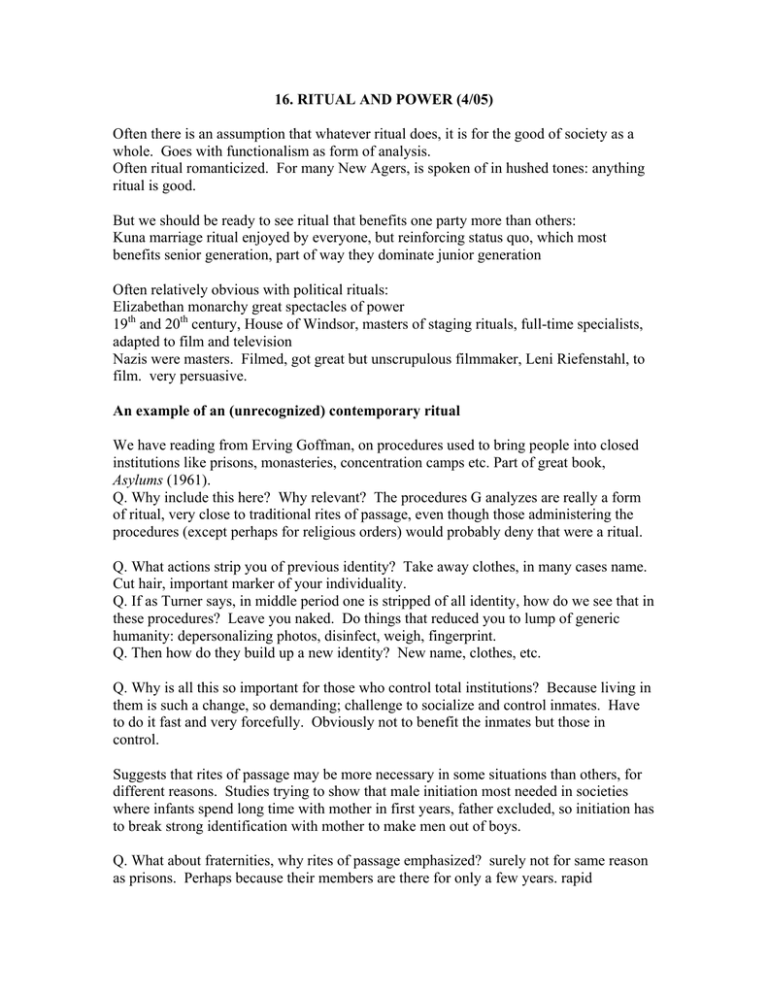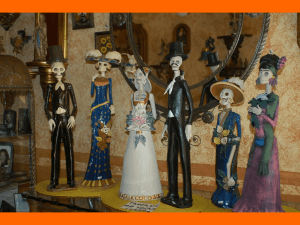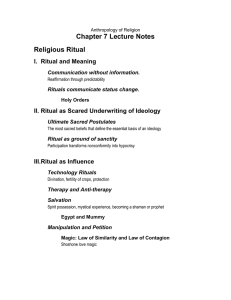16. RITUAL AND POWER (4/05)
advertisement

16. RITUAL AND POWER (4/05) Often there is an assumption that whatever ritual does, it is for the good of society as a whole. Goes with functionalism as form of analysis. Often ritual romanticized. For many New Agers, is spoken of in hushed tones: anything ritual is good. But we should be ready to see ritual that benefits one party more than others: Kuna marriage ritual enjoyed by everyone, but reinforcing status quo, which most benefits senior generation, part of way they dominate junior generation Often relatively obvious with political rituals: Elizabethan monarchy great spectacles of power 19th and 20th century, House of Windsor, masters of staging rituals, full-time specialists, adapted to film and television Nazis were masters. Filmed, got great but unscrupulous filmmaker, Leni Riefenstahl, to film. very persuasive. An example of an (unrecognized) contemporary ritual We have reading from Erving Goffman, on procedures used to bring people into closed institutions like prisons, monasteries, concentration camps etc. Part of great book, Asylums (1961). Q. Why include this here? Why relevant? The procedures G analyzes are really a form of ritual, very close to traditional rites of passage, even though those administering the procedures (except perhaps for religious orders) would probably deny that were a ritual. Q. What actions strip you of previous identity? Take away clothes, in many cases name. Cut hair, important marker of your individuality. Q. If as Turner says, in middle period one is stripped of all identity, how do we see that in these procedures? Leave you naked. Do things that reduced you to lump of generic humanity: depersonalizing photos, disinfect, weigh, fingerprint. Q. Then how do they build up a new identity? New name, clothes, etc. Q. Why is all this so important for those who control total institutions? Because living in them is such a change, so demanding; challenge to socialize and control inmates. Have to do it fast and very forcefully. Obviously not to benefit the inmates but those in control. Suggests that rites of passage may be more necessary in some situations than others, for different reasons. Studies trying to show that male initiation most needed in societies where infants spend long time with mother in first years, father excluded, so initiation has to break strong identification with mother to make men out of boys. Q. What about fraternities, why rites of passage emphasized? surely not for same reason as prisons. Perhaps because their members are there for only a few years. rapid changeover. Challenge for universities in general in building and keeping continuity. Also, not everything in rites of passage always about passage, also displaying symbols etc. of fraternity, building solidarity among those already in. Bombs and ritual We have another example in readings of unrecognized ritual, from Hugh Gusterson, in our Program studied nuclear physicists at Livermore Labs, bomb scientists This article on atomic testing Not overtly recognized as ritual. In Book, published comments from informants and others in appendix, one of them took great exception to idea that ritual, said was straightforward way to test bomb (Hugh Gusterson, Nuclear Rites, 1996) Q. So if it is a ritual, what does it do? Rite of passage, makes them fully adult bombmakers. Q. But what else does it do? Complex combination. Convinces them they have control. What actually tested in explosion is only tiny part of all the things people are concerned with regarding the dangers of nuclear weapons. But by proving they have control over this part, convince self of more general control So ritual may deal with plaguing questions in society Or impossible demands or questions Anthony Wallace, classic study of Iroquois, suggested that were great demands on men, to be independent, hard, fierce, autonomous warrior. Not dependent in any way. But this very hard to live up to. Had rituals involving masked spirits, false faces, often very infantile. Also had complex in which one got whatever one dreamed about---some object, someone’s wife, etc. If dreamed, could not be denied. W. suggests that particular things men asked for were much less important than chance to regress, to be childish, wheedling So W’s analysis is psychological Ritual escape valve, dealing with institutionalized strains In 19th century middle-class America, tremendous number of lodges and orders, like Masons, Shriners, etc. many others. Men would have meetings with arcane secret rituals, dress up in robes, lots of mumbo-jumbo. Hard to avoid suspicion that men compensating for something---perhaps cult of domesticity at home, highly developed in 19th century. Men too respectable just to go off to bar every night and get blasted. Difficult transition for young men to adult manhood. (Mark Carnes, Secret Ritual and Manhood in Victorian America, 1989). Can even be fundamental contradictions in society Concerning symbolic classifications, said some oppositions may be more fundamental than others Hegel and Marx both advance (in different ways) the notion of contradiction, either logical contradiction or social contradiction: two beliefs or tendencies or rules or practices that clash in some fundamental way. Society full of them: Our political system: legislator supposed to represent district, voters, but also own conscience. John Kennedy’s Profiles in Courage about men who went with own conscience. But if completely ignore voters, wrong too. Can be reconciled partially, something patched together, but still at root contradictory We believe in strong leaders and in collective action Common good vs. individual rights Ritual often in some way about fundamental contradictions or problems or issues Not just positively affirming community or order but trying to deal with mess and furor and inconsistency of life. Fox-hunting, power, and contradiction Reading on fox hunting, treating it as a ritual Britain has been convulsed over issue Majority of voters in country want it banned But September 2002, I was in London during huge march in favor hundreds of thousands of people, supporting fox hunting as symbol of rural values, many participants who didn’t hunt themselves There were also counter-protestors. News media showed animal rights women screaming and spitting at marchers, calling them scum The article predates current controversy. Point of departure was article by Leach, attempt to analyze British weirdness about animals in an analysis like Douglas’s of Leviticus and Tambiah: treats fox and rabbit esp. as liminal animals. very amusing, provocative. (Edmund Leach, “Animal Categories and Verbal Taboo” in New Directions in the Study of Language, Eric Lenneberg, ed., 1964) But ultimately forced. Rabbits said to be liminal, sexy; foxes liminal and taboo because both animals on border between two domains defined in terms of location. Weak explanation. Rabbits sexy for obvious reason, great fecundity. Foxes more complex. Q. So how does ritual work in terms of terminology; participation; leadership; actions; use of space; animals? Q. What kinds of social divisions is ritual papering over? Different classes, esp. crucial one between farmers (renters who work the land) and gentry, aristocracy who own it. And also between new people and old established people. Q. What kinds of contradictions, tensions, issues? -assumption of social fixity, stability, everyone in place, but in fact social mobility, striving -tension between ascription, assigned place, and achievement, excellence: try to make the same but not always so. -mess, complications, in use kinship and genealogies for social status. Inconsistent, messy. -local, rural vs. national. Supposedly apotheosis of rural, but great development when people could come by train and car. -Model of great magnate who can support by self; in fact, almost no one can, so approximate by doing collectively -individual rights, esp. in land, vs. collective power -democracy vs. hierarchy. Q. So what is place of fox? Leach right, is liminal, ambivalent. But not because on borderline between field and game. Rather because is substitute for deer. Two other varieties of chase, after rabbits with beagles, and after otters, but neither offers opportunity to gallop on horseback. Just as with nuclear scientists, some participants insist it is a sport, not ritual. Participate for pleasure. But not inconsistent that both personal pleasure and collective ritual. And when have huge rally to support hunting, it’s not “just a sport”. For that matter, much more going on with modern sports than just a game.


